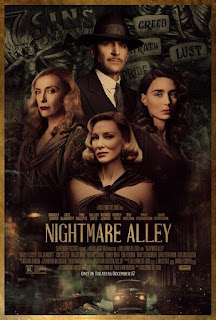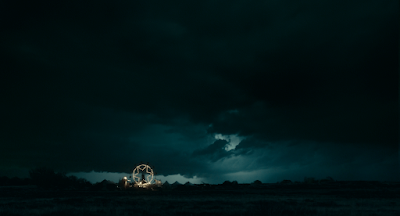or
"...It's All Geek To Me"
We meet Stanton Carlisle (Bradley Cooper) in the middle of committing a crime; in a soon-to-be-abandoned house, he drags a body to a waiting hole in the floor-boards, strikes a match—we see a gas-can on the floor behind him—and sets the room and the clapboard structure on fire. Then he simply walks away, next stop...anywhere, U.S.A.
It's a bus-ride to where he's going. And he gets off at the designated restaurant, but he moves on to the glowing lights of a carnival, drawn to it like a moth to a flame. He moves over to a structure blanketed with "'Odd'-i-torium" and he goes in; for a quarter, he can see "The Geek" described by carny boss Clem Hoatley (Willem Dafoe) as a "supreme oddity—is he man of beast?" And as the slack-jawed crowd of curious gawkers gathers around a small arena, "The Geek," mangy and disheveled, is let out of his cage and thrown a live chicken which he bites in the neck and tears its head off. Repulsed, Stan leaves but is followed by Hoatley: "What's your pitch, pal? You on the low?"
Within ten minutes Carlisle is hired as a roustabout, and one of his jobs is to round up the geek when he escapes his cage. Stan is sent in through the demonically-themed fun-house, it's signs warning of damnation and sees the geek, cowering. Ignoring Hoatley's advice, he tries to entice the man on his own and ends up getting concussed by a brick. Before any more damage can be done, he's found, the geek trussed up and Hoatley, fearing repercussions, offers him a steady job with the carnival. At night, he dreams dreams of flames, but in the morning, he helps fold up the tent and move on with the show—they're meeting up with another troupe down the road.The spot they stop is a lot with an already-established carnival and across the dirt road is the house of Madame Zeena (Toni Collette) and her husband, Pete (David Strathairn), a once very successful mentalist act, gone on to hard times because of Zeena's philandering and Pete taking to drink. There is still talent in the older gentleman, but his will is broken, but he sees talent in the young man who's come to the house with the newly-arrived vagandonds and wants a bath. Zeena sees something in him, too, and seduces him—not that it takes much—and reads his fortune with her Tarot cards and it's ominous. Carlisle doesn't believe in such nonsense, not believing in fate, but only in the weakness he notices in others. He thinks he'll do very well.If you've seen the 1947 version, you'll recognize a lot of what's going on as gone before. Watching this version of Nightmare Alley, though, evokes the same feeling one had when watching Martin Scorsese's version of Cape Fear after having seen the original. It's the same story, but in another location, one steeped in the obsessions of the director. Where the first story was done to get the material down, the new one is richer, more grandiose, and more nuanced. No one's worried about time or hurrying the scene along. There is so much detail that to have it go any faster would be to miss something. The screenplay—by director Guillermo del Toro and his wife Kim Morgan—author of the "Sunset Gun" blog—is based on the original novel by William Lindsay Gresham, not on the original's screenplay by Howard Hawks scribe Jules Furthman. As such, it's a bit more "on the nose" and spells things out, announcing its themes and intentions so that no one misses the point. Rather than hurting the movie, it only gives it more depth, as the story can take the weight.The casting is top-notch in the way the original couldn't be—there everyone was attractive—and populated by character actors of great depth. Cooper is Tyrone Power handsome, but he has a boyish "something" that makes him attractive—a kid in a man's body. Rooney Mara plays Molly, who is far more waif-like, but still evokes an inner strength and del Toro veteran Ron Perlman plays her guardian, Bruno, the carnival strong-man. Collette and Strathairn are both studies in washed-up talent, resigned to their fates but capable of showing glimpses of their glory days, and as Dr. Lilith Ritter, a fellow con artist as psychiatrist, Cate Blanchett risks parody by playing a creature of constantly challenging seduction, as if Lauren Bacall was playing a villain.
This is something of a first for del Toro, who leaves behind the monsters' realm (temporarily, I assume), even while keeping one separated foot planted firmly in the grotesque. It's not his usual genre, as it's not a horror movie (and hewing closer to noir), but it flirts with it, the way that Carlisle will flirt with the mystical and the spiritual when he thinks using mentalist tricks isn't enough of a high-stakes racket for him. Because it's not enough to play tricks on people, to "read" them and use it against them, convince them that you have a power that they don't have. It's an endlessly escalating mind-game for both players. But, the hubris that results can make the fall from great heights higher than it appears.
And Carlisle is just a beginner. He's not a mind-reader. He's a weakness-reader. A need-reader. It would have been better if he'd learned the tarot, so he could learn the future, but even when he's told what it is, even when it's spelled out in so much detail, he doesn't believe it. And maybe that has something to do with control. The future isn't written; he has no way to sway it. No way to read it, like the past on a man's face. And he's as much a paying customer—a rube—as anybody else is when it comes to Fate.And that just doesn't cut it for the smartest man in the room, the man who knows everything about everybody.
Except himself. Except that he's not as smart as he thinks he is.










No comments:
Post a Comment